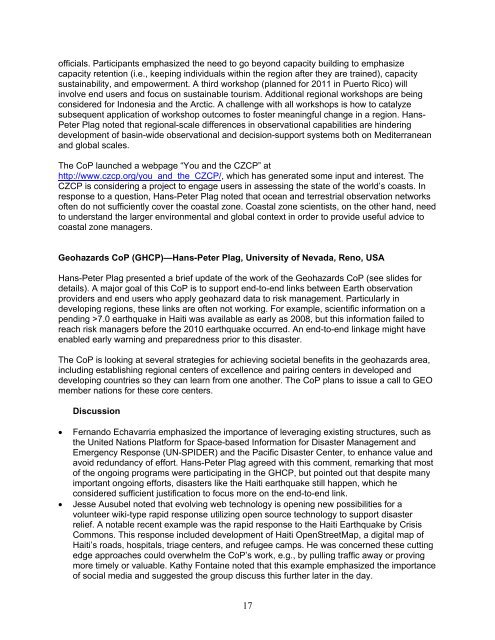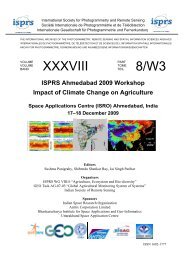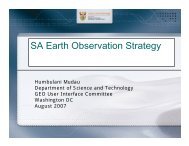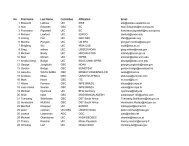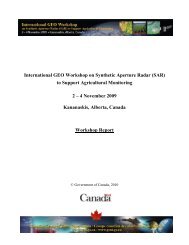GEO UIC Committee: - Group on Earth Observations
GEO UIC Committee: - Group on Earth Observations
GEO UIC Committee: - Group on Earth Observations
Create successful ePaper yourself
Turn your PDF publications into a flip-book with our unique Google optimized e-Paper software.
officials. Participants emphasized the need to go bey<strong>on</strong>d capacity building to emphasize<br />
capacity retenti<strong>on</strong> (i.e., keeping individuals within the regi<strong>on</strong> after they are trained), capacity<br />
sustainability, and empowerment. A third workshop (planned for 2011 in Puerto Rico) will<br />
involve end users and focus <strong>on</strong> sustainable tourism. Additi<strong>on</strong>al regi<strong>on</strong>al workshops are being<br />
c<strong>on</strong>sidered for Ind<strong>on</strong>esia and the Arctic. A challenge with all workshops is how to catalyze<br />
subsequent applicati<strong>on</strong> of workshop outcomes to foster meaningful change in a regi<strong>on</strong>. Hans-<br />
Peter Plag noted that regi<strong>on</strong>al-scale differences in observati<strong>on</strong>al capabilities are hindering<br />
development of basin-wide observati<strong>on</strong>al and decisi<strong>on</strong>-support systems both <strong>on</strong> Mediterranean<br />
and global scales.<br />
The CoP launched a webpage “You and the CZCP” at<br />
http://www.czcp.org/you_and_the_CZCP/, which has generated some input and interest. The<br />
CZCP is c<strong>on</strong>sidering a project to engage users in assessing the state of the world’s coasts. In<br />
resp<strong>on</strong>se to a questi<strong>on</strong>, Hans-Peter Plag noted that ocean and terrestrial observati<strong>on</strong> networks<br />
often do not sufficiently cover the coastal z<strong>on</strong>e. Coastal z<strong>on</strong>e scientists, <strong>on</strong> the other hand, need<br />
to understand the larger envir<strong>on</strong>mental and global c<strong>on</strong>text in order to provide useful advice to<br />
coastal z<strong>on</strong>e managers.<br />
Geohazards CoP (GHCP)—Hans-Peter Plag, University of Nevada, Reno, USA<br />
Hans-Peter Plag presented a brief update of the work of the Geohazards CoP (see slides for<br />
details). A major goal of this CoP is to support end-to-end links between <strong>Earth</strong> observati<strong>on</strong><br />
providers and end users who apply geohazard data to risk management. Particularly in<br />
developing regi<strong>on</strong>s, these links are often not working. For example, scientific informati<strong>on</strong> <strong>on</strong> a<br />
pending >7.0 earthquake in Haiti was available as early as 2008, but this informati<strong>on</strong> failed to<br />
reach risk managers before the 2010 earthquake occurred. An end-to-end linkage might have<br />
enabled early warning and preparedness prior to this disaster.<br />
The CoP is looking at several strategies for achieving societal benefits in the geohazards area,<br />
including establishing regi<strong>on</strong>al centers of excellence and pairing centers in developed and<br />
developing countries so they can learn from <strong>on</strong>e another. The CoP plans to issue a call to <str<strong>on</strong>g>GEO</str<strong>on</strong>g><br />
member nati<strong>on</strong>s for these core centers.<br />
Discussi<strong>on</strong><br />
• Fernando Echavarria emphasized the importance of leveraging existing structures, such as<br />
the United Nati<strong>on</strong>s Platform for Space-based Informati<strong>on</strong> for Disaster Management and<br />
Emergency Resp<strong>on</strong>se (UN-SPIDER) and the Pacific Disaster Center, to enhance value and<br />
avoid redundancy of effort. Hans-Peter Plag agreed with this comment, remarking that most<br />
of the <strong>on</strong>going programs were participating in the GHCP, but pointed out that despite many<br />
important <strong>on</strong>going efforts, disasters like the Haiti earthquake still happen, which he<br />
c<strong>on</strong>sidered sufficient justificati<strong>on</strong> to focus more <strong>on</strong> the end-to-end link.<br />
• Jesse Ausubel noted that evolving web technology is opening new possibilities for a<br />
volunteer wiki-type rapid resp<strong>on</strong>se utilizing open source technology to support disaster<br />
relief. A notable recent example was the rapid resp<strong>on</strong>se to the Haiti <strong>Earth</strong>quake by Crisis<br />
Comm<strong>on</strong>s. This resp<strong>on</strong>se included development of Haiti OpenStreetMap, a digital map of<br />
Haiti’s roads, hospitals, triage centers, and refugee camps. He was c<strong>on</strong>cerned these cutting<br />
edge approaches could overwhelm the CoP’s work, e.g., by pulling traffic away or proving<br />
more timely or valuable. Kathy F<strong>on</strong>taine noted that this example emphasized the importance<br />
of social media and suggested the group discuss this further later in the day.<br />
17


